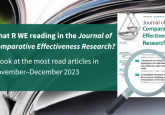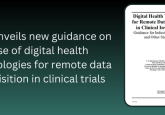Peterson Health Technology Institute launches new assessment framework for digital health technologies

In partnership with the Institute for Clinical and Economic Research, the Peterson Health Technology Institute has released a new framework towards evaluating whether innovative healthcare technologies improve health care and lower costs.
The recently formed Peterson Health Technology Institute (PHTI) has announced the release of a new framework for assessing whether innovative healthcare technologies improve health and lower costs. Developed in partnership with the Institute for Clinical and Economic Research (ICER), the ICER-PHTI Assessment Framework for Digital Health Technologies (DHTs) will be used to conduct value assessments of DHTs such as digital therapeutics, chronic care management apps, remote patient monitoring, and administrative technologies, to support purchasing decisions for employers, providers, and health plans.
“PHTI aims to raise the bar for technology-driven advances in healthcare delivery, including superior outcomes, convenience, access, and affordability,” asserted Caroline Pearson, Executive Director of the Peterson Center on Healthcare on LinkedIn. “We are engaging closely with stakeholders across the industry to understand what information purchasers need to inform their decisions and what evidence tech companies can produce to demonstrate value.”
A range of experts in health technology assessment (HTA), clinical care delivery, health economics, and patient perspectives were involved in the development of the new framework.
“PHTI’s thorough and thoughtful evaluation approach to emerging digital health technologies marries the best of what we know on effective clinical and economic assessments, with a real view to societal benefit,” explained Lauren Taylor, Assistant Professor at NYU Grossman School of Medicine and NYU Wagner School of Public Service, an independent advisor to PHTI for grounding their approach in a socially responsible framework.
PHTI have produced an abbreviated overview of the assessment approach, in addition to the full document, outlining the methods the framework will use to examine a product’s clinical safety and effectiveness, real-world user experience, impact on health equity, and economic impact. Their clinical effectiveness analysis incorporates ICER’s Evidence Rating Matrix.
PHTI will summarize its assessment findings by issuing one of the following three ratings:
- Evidence is sufficient to support adoption
- Potential for performance supports further testing and evidence generation
- Evidence is inadequate to support adoption or further testing at this time
Notably, as part of its economic impact assessment, PHTI will publish a threshold price at which the health technology would produce material cost savings compared with the standard of care. This represents a departure from more traditional HTA, which measures value based on long-term cost-effectiveness rather than a budget impact analysis.
In response to the launch of the ICER-PHTI assessment framework, Kimberly Westrich, Director of Value and Access Strategy at Cencora, questioned on LinkedIn: “Is ICER’s new digital health value assessment framework relevant as technology pivots to OTC?”. Citing a recent example, Westrich detailed an announcement by Akili who are shifting to a non-prescription business model for its digital medicine products, following impressive adoption and financial statistics since the June 2023 direct-to-consumer release of its attention-deficit/hyperactivity disorder (ADHD) app. Westrich commented: “If more companies follow Akili’s lead, the new ICER-PHTI framework may already be irrelevant.”
Want regular updates on the latest real-world evidence news straight to your inbox? Become a member on The Evidence Base® today>>>






